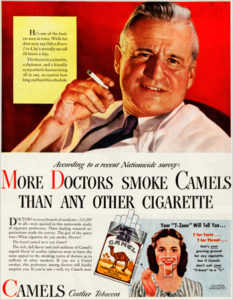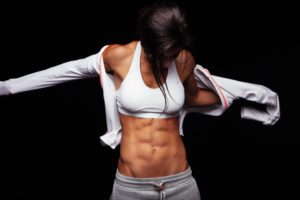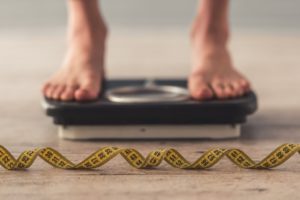PERSONAL EXPERIENCE
This topic takes me on a wistful and sometimes regretful journey to memories of past years. How did I make it through?
Cigarette smoking would improve my digestion. I should only sip water and take salt pills during college tennis matches. Weight training would make me “muscle bound” and thus less flexible. Muscles would turn to fat if I stopped working out. (Don’t they need to atrophy first?). Weight training would adversely affect my shooting touch in high school basketball. Strength had nothing to do with weight lifting. Working out was not necessary – “let your muscles grow by themselves”. “All the bodybuilders are gay”. Sex before a competitive sport will deplete your energy and strength.![]()
This was a time when ads for Charles Atlas showed a bully kicking sand toward a frail gentleman, after which that gentleman began the “Dynamic Tension” program. You know the rest – he soon came back to the beach and “whooped up on” the bully, as Muhammed Ali would have said. This was at a time shortly after Cassius Clay became Muhammed Ali.

Does anyone else remember when star athletes unapologetically, even gleefully, endorsed cigarette brands? Joe DiMaggio did this. So did Mickey Mantle. Incredibly, so did physicians. I clearly remember a time when I was interviewing for a civilian job after my military service. My interviewer pulled out a cigarette and lit up. He offered me one. I politely declined. What makes this a memory is his undisguised look of disbelief at my choice. Maybe he was offended.
This was the late 1960s. Smoking was okay in classrooms, in airplanes, in movie theaters and in all restaurants. A bit later, restaurants began to show “smoking” and “non – smoking” sections. The sections were often so near each other that this was useless and quite laughable.
Since this is about my personal experience, I need to avoid seeming “preachy”. I bought into the claim that cigarettes would improve my digestion and that they would provide peace and relaxation. Maybe. But my most honest reflection is that I wanted to be “cool” and trendy. I smoked for about 4 years and then quit totally during my two years of active military service at age 25.
MYTHS AND FACTS
(1) We may lose fat at specific spots on our bodies if we concentrate our training there. (No, spot training does not work. Crunches or leg raises may add muscle to our waist area, but we must lose fat overall to see less fat at our core).
(2) Stretching before a workout is beneficial. (Not true. The best pre-workout advice is to keep our bodies moving, not to hold a stretch).
(3) Lots of cardio is the best way to lose weight. (This certainly helps, but it works far better with strength training. More lean muscle mass allows us to burn more calories, even at rest).
(4) Heavy sweating means you really worked hard. (Yes, exercised muscles create heat, but temperature and humidity are also factors. We perspire more in 80 degree temperatures than at 40 degrees. Care must be taken when working out in high humidity)
(5) Strength training will always make you gain bulk. (Untrue, but more likely for men than for women because of hormonal differences. Exercising for strength may allow us to become leaner).
(6) Workouts should last at least an hour. (Not when you do really intense interval training).
(7) Sports drinks are good for you. (Not really. They are loaded with sugar).
(8) You can turn fat into muscle. (No, they are different types of tissue).
(9) You will start losing muscle mass after a week of inactivity. (Not unless you have just begun training. Someone who has worked out consistently for a year or more will have no loss).
(10) Bigger muscles always indicate greater strength. (No, a simple comparison of power lifters with bodybuilders will disprove this).
(11) Weight gain indicates fat gain. (Absolutely not. Muscles outweigh fat).
(12) The cardio part of workouts should be done first. (No, the use of aerobic energy makes us tired more quickly than does the strength training. We need to save energy for the entire workout).
(13) Holidays are reasonable excuses for annual weight gain. (Not really. The New England Journal of Medicine says that such increase averages only about a pound – as during Thanksgiving – and that such gain may be due to laziness if it is maintained for a year)

(14) Crunches and other abdominal exercises will build a “6 pack” at your core. (Not unless you also have a healthy diet.
(15) Swimming is great for weight loss. (Swimming is excellent for building lung capacity and toning, but will not produce significant weight loss unless you are swimming for hours daily).
(16) No pain = no gain. Work through the pain. (Wrong. Some soreness is to be expected, but to really hurt during a workout indicates doing the exercise incorrectly or having a pre-existing injury).
(17) An aerobic workout will create calorie burning well after you finish. (Somewhat true, but this is minimal and often overstated).
(18) Hold weights when you take a walk. (This has little benefit. Holding heavy weights may affect your stride and cause injury. Very light weights add negligible calorie burning).
(19) Work out even when you don’t feel like it. (Bad advice. You may be sore, sick or lacking in sleep. Your body needs to recover).
(20) The more exercise the better. (Not true if you begin to feel fatigued or stressed. Your progress may be curtailed).
(21) Never eat past 8:00 PM. (It doesn’t matter. Your body needs time to digest and use the nutrients anyway. Sleeping while hungry may be difficult).
(22) Don’t eat high calorie food after a workout. (Wrong. Food doesn’t negate exercise and you need to replenish the nutrients burned up).
(23) Working out in the morning is preferable. (Not necessarily. Moving your body at any time is okay. Adjust according to your schedule).
CONCLUSIONS
We are works in progress, hopefully. There seems to never be a sparsity of advice from others, constructive or merely doctrinaire and righteous. Factor in the changes in our culture and progress in the field of sports medicine and physical education – and then we can be better equipped to give our bodies the treatment they deserve. It has been fascinating to look back at exercise and health views in the last 60 years. It is also instructive to see the flux in contemporary “rules”, knowing that many of these will become outdated in subsequent years.
Questions or comments? Hit me up in the “comments” box or email me – richard@myworkoutathome.com. Be well!